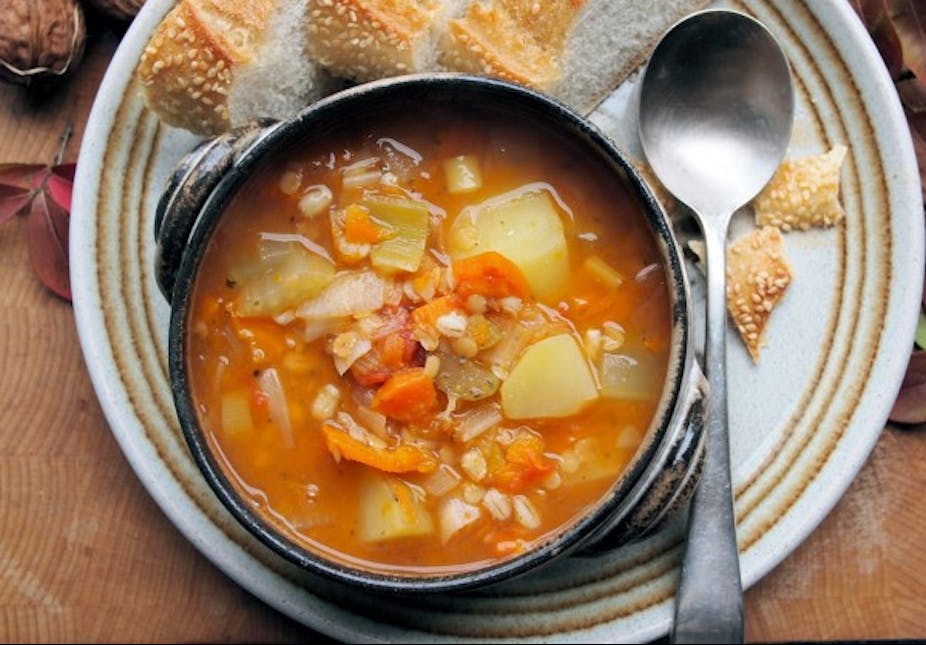There’s an old saying, you are what you eat. If you look at the average Australian diet, we’re in trouble.
The rise of the 24/7 society, unsocial work hours and an accelerating pace of life have led the consumption of fast food to soar. Nearly one in four of the meals we eat are prepared outside the home and they tend to contain more fat, salt and sugar than the homemade equivalent.
Alongside the negative health outcomes of fast food are the environmental impacts of industrialised food production and packaging, and management of food waste.
Time to slow down
A slow food movement has arisen to counteract fast food and fast life, by encouraging us to revalue the time we spend on preparing, sharing, and consuming food. It aims to enhance the personal connection between food producers and consumers, and reduce our reliance on mass-produced foods purchased from supermarket monopolies.
Slow Food is a global alternative food network, founded in 1989 in Italy by left-wing food activist Carlo Petrini (though its origins can be traced back to 1986), which has grown to over 100,000 members across 153 countries, including 31 local branches within Australia. These branches, known as convivia, are run by volunteers who coordinate activities in their area: shared meals and tastings, visits to local producers and farms, and educational events about the source of food, farming methods and sustainability.
Local convivia have also become involved in school kitchen garden projects and supported the growth of farmers’ markets.
More broadly, Slow Food promotes the purchase of local produce with a reduction in food miles and a celebration of regional cuisines and local food traditions.
Fair trade is a central concern, with the aim to reduce worker/farmer exploitation and facilitate equitable trading relationships between developing and developed nations.
The movement also advocates for sustainable agricultural techniques and encourages the reduction of food additives, irradiation, and genetic modification.
Perhaps most importantly, Slow Food attempts to show how we can revalue the time we spend on food so as to invest in quality food time for our personal (health and pleasure) and collective (social, cultural, and environmental) benefit.
Studying Slow Food
We have explored what motivates or deters people from engaging in ethical (slow) consumption, and their experiences with the Slow Food movement.
Our first study explored the representation of Slow Food within the Australian print media to provide insights into how public opinion may be formed. Slow Food was portrayed in a positive but largely uncritical, apolitical way, despite the left-wing origins of the movement.
In examining the theme of time in our data, we found an emphasis on slowing down the pace of life. Time was both an opportunity to be taken, and a harsh master:
The Slow Food philosophy enjoins us to take the time to enjoy one of life’s daily pleasures… there’s no doubt that cooking, eating and life in general is a lot more enjoyable when we’re not slaves of time.

Our second study explored the experiences and motivations of consumer and producer participants in a Melbourne-based Slow Food festival. From our interview data, “time” emerged as a key theme underlying people’s interest in Slow Food as a form of virtuous consumption, but also a key challenge in terms of adopting a Slow Food lifestyle.
As one participant said:
I think that is why everybody is in a hurry because they don’t actually value that that’s the important thing to stop and do.
Another participant put the time challenge this way:
I’m still part of the rush of modern life but… I would want to eventually live that way. I just have to figure out how to do it… it’s a time issue. It’s a matter of changing my life to go into that time mode.
Why isn’t everyone slowing down?
Our participants acknowledged many barriers to adopting a Slow Food lifestyle, such as cost, time, and inconvenience. Slowing down requires a major investment of time in educating oneself about food and then procuring ethically produced food.
While many of our study participants said they supported the movement and held ethical consumer values, they weren’t necessarily prepared to change their behaviour.
Critics of Slow Food have argued the movement caters to the privileged and wealthy who can afford the time and cost involved. They suggest that its focus on gourmet experiences reflect elitist connotations of “good taste”, luxury goods, and social distinction. One study in the United States reports that Slow Food members tended to favour gastronomic experiences over political action.
What can we learn from Slow Food?
For individuals, the movement reminds us of the need to be aware of the origins of our food, including the implications of food production on personal health and the wider environment.
But individual action can only go so far, and the barriers are likely to be too great for most.
At the societal level, Slow Food highlights the need for changes to our food system. Our continuing studies in this area aim to gain an understanding of what attracts people to Slow Food and how this attraction may be translated into behavioural and wider social change.

